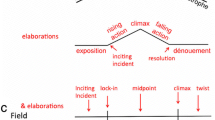Abstract
The article is concerned with the issue of quality in drama, opera, and ballet, respectively. Relying on data from an expert opinion survey and from the statistical yearbook on theatres in Germany, the problem is addressed to what extent quality is linked to certain economic variables. After appropriately aggregating the ordinal expert judgments while controlling for expert-specific standards it is shown that this link is considerably closer for ballet and opera than for drama. Furthermore, in all three art forms positive but decreasing marginal returns of artistic expenses in terms of quality prevail.
Similar content being viewed by others
References
Abbé-Decarroux, Francois (1994) “The Perception of Quality and the Demand for Services: Empirical Application to the Performing Arts”. Journal of Economic Behavior and Organization 23: 99-107.
Conover, William J. (1971) Practical Nonparametric Statistics. J. Wiley & Sons, New York.
DBV 1995/96, Theaterstatistik 1995/96, 31st issue, and the following three issues [statistical yearbook edited by Deutscher Bühnenverein (DBV)].
Jenkins, Stephen and Austin-Smith, David (1987) “Interdependent Decision-Making in Non-Profit Industries”. International Journal of Industrial Organization 5: 149-174.
Krebs, Susanne and Pommerehne, Werner W. (1995) “Politico-Economic Interactions of German Public Performing Arts Institutions”. Journal of Cultural Economics 19: 17-32.
Levy, Emanuel (1988) “Art Critics and Art Publics: A Study in the Sociology and Politics of Taste”. Empirical Studies of the Art 6: 127-148.
Lévy-Garboua, Louis and Montmarquette, Claude (1996) “A Microeconometric Study of Theatre Demand”. Journal of Cultural Economics 20: 25-50.
Mallows, Colin L. (1973) “Some Comments on Cp”. Technometrics 15: 661-675.
Pindyck, Robert S. and Rubinfeld, Daniel L. (1991) Econometric Models and Economic Forecasts. McGraw-Hill, New York.
Throsby, C. David (1990) “Perception of Quality in Demand for Theatre”. Journal of Cultural Economics 14: 65-82.
Tobias, Stefan (2003) Kosteneffizientes Theater? Deutsche Bühnen im DEA-Vergleich (Cost-efficient performing arts? German theatres in a DEA comparison). Doctoral dissertation, University of Dortmund. Abstract and download at http://eldorado.uni-dortmund.de:8080/FB11/LS10/Forschung/2003/Tobias.
Urrutiaguer, Daniel (2002) “Quality Judgements and Demand for French Public Theatre”. Journal of Cultural Economics 22: 185-202.
Author information
Authors and Affiliations
Rights and permissions
About this article
Cite this article
Tobias, S. Quality in the Performing Arts: Aggregating and Rationalizing Expert Opinion. Journal of Cultural Economics 28, 109–124 (2004). https://doi.org/10.1023/B:JCEC.0000019472.97483.8c
Issue Date:
DOI: https://doi.org/10.1023/B:JCEC.0000019472.97483.8c



